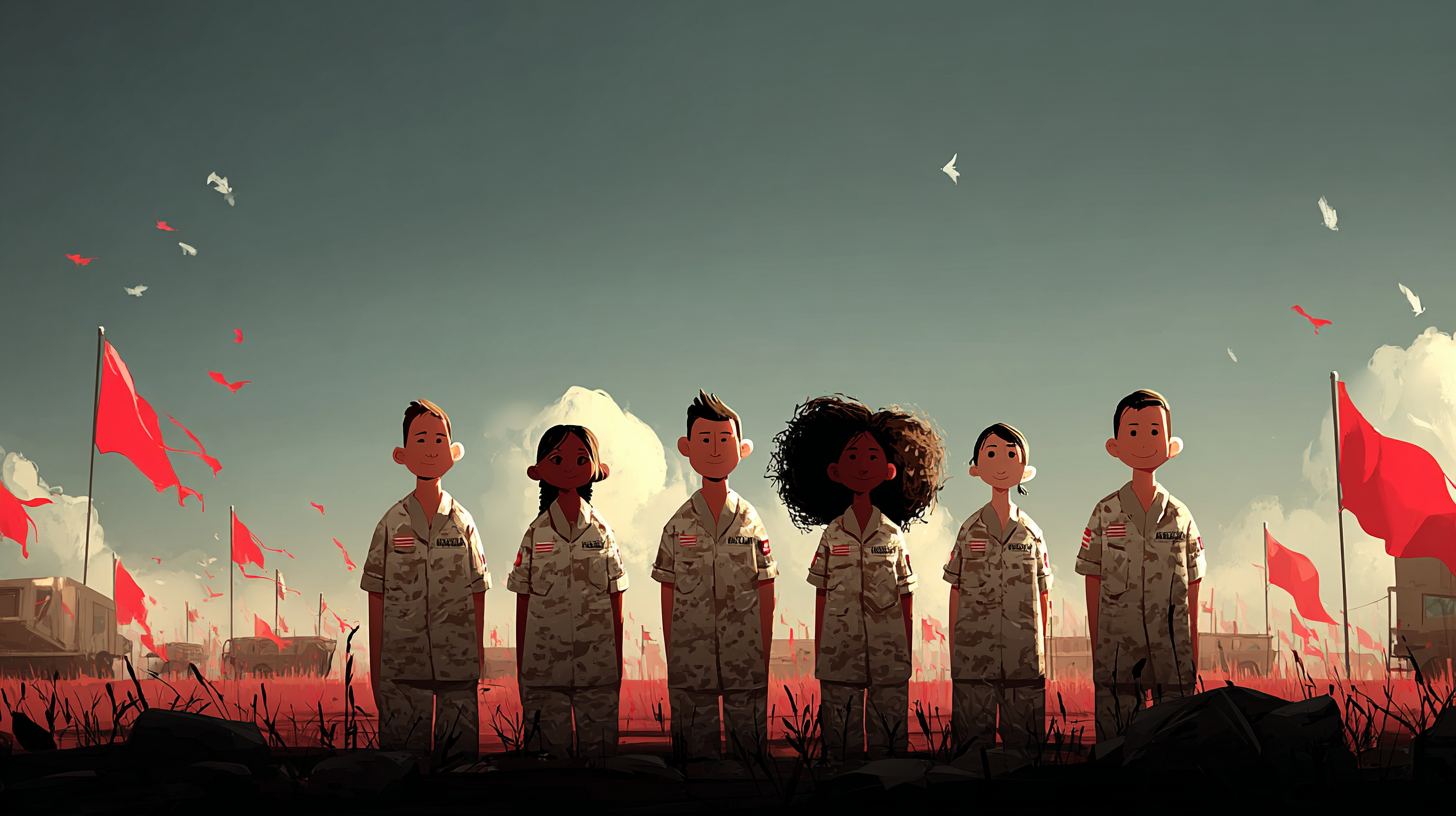An “army” is a group of soldiers that protects a country.
「army」は国を守るための兵士の集まりのことです。
以下は英単語 “army” に関するストーリー型学習コンテンツです。まずは大枠の意味を理解して最後の文章で確認しましょう。
主な意味(main meaning)
| 品詞 | 発音記号 (IPA) | 意味(簡潔) | 英語例文 |
|---|---|---|---|
| 名詞 | /ˈɑːr.mi/ | 国家や組織の軍隊 | The army protected the country from invasion. |
語源(etymology)
中世ラテン語 armata(武装した集団)から、古フランス語 armé を経て英語に入った。
核となるイメージは「武装した大きな集団」。
類義語(synonyms)
| 類義語 | 英語例文 |
|---|---|
| military | The military is training new recruits. |
| troops | The troops marched through the city. |
| soldiers | Many soldiers were sent to the border. |
| forces | The forces were ready for battle. |
| regiment | The regiment was stationed in the north. |
反義語(antonyms)
| 反義語 | 英語例文 |
|---|---|
| civilians | Civilians were evacuated from the war zone. |
| peace | The treaty brought peace to the region. |
コロケーション(collocations)
| コロケーション | 英語例文 |
|---|---|
| join the army | He decided to join the army after high school. |
| army base | The army base is located near the coast. |
| army officer | She became an army officer after years of training. |
| regular army | The regular army was supported by volunteers. |
| army camp | The soldiers stayed in the army camp during training. |
2項表現(binomials)
| 2項表現 | 英語例文 |
|---|---|
| army and navy | The army and navy worked together during the mission. |
| peace and war | People hope for peace and war to never return. |
英語ストーリー(english story)
John had always admired the army since he was a child. His grandfather had been a brave soldier who served in the regular army and told him many stories about discipline, teamwork, and courage. After graduating from high school, John decided to join the army. His parents were proud but also worried about the dangers.
On his first day at the army base, John met many new recruits. Some had family members in the military, while others had no experience at all. The army officers gave them uniforms, boots, and training schedules. John found the training hard at first, but he quickly got used to the early mornings and long runs.
One day, the army and navy worked together in a large training exercise. The troops had to cross a river, build a temporary bridge, and move equipment. John was assigned to a team that transported supplies. He learned how important teamwork was in the military. During the exercise, the soldiers also practiced emergency rescues for civilians in dangerous situations.
After several months, John’s regiment was sent to an army camp in the north. The weather was cold, but the forces continued training every day. John began to understand that the army was not only about fighting in war but also about protecting peace. His commander often said, “The goal is peace, but we prepare for war.” John realized that even though civilians might not understand the army’s daily work, it was essential for the safety of the country.
By the end of the year, John had become stronger, more disciplined, and more confident. He still remembered his grandfather’s words: “Serving in the army is not only about defending borders; it’s about serving people.”
和訳
ジョンは子どものころからずっと**army(軍隊)に憧れていました。彼の祖父はregular army(正規軍)で勇敢に戦った兵士で、規律、チームワーク、勇気について多くの話をしてくれました。高校を卒業した後、ジョンはjoin the army(軍隊に入る)**ことを決めました。両親は誇りに思う一方で、その危険も心配していました。
初めての**army base(軍事基地)の日、ジョンは多くの新兵と出会いました。家族にmilitary(軍隊)**経験者がいる人もいれば、まったく経験がない人もいました。**army officers(陸軍将校)**は制服やブーツ、訓練スケジュールを配りました。最初は訓練が大変でしたが、ジョンはすぐに早起きや長距離走に慣れました。
ある日、**army and navy(陸軍と海軍)**が合同で大規模な訓練を行いました。**troops(部隊)は川を渡り、仮設の橋を作り、装備を運びました。ジョンは物資輸送のチームに配属され、軍隊でのチームワークの重要性を学びました。訓練の中で、兵士たちは危険な状況にいるcivilians(民間人)**を救出する練習も行いました。
数か月後、ジョンの**regiment(連隊)は北部のarmy camp(軍のキャンプ)**に派遣されました。天候は寒かったものの、**forces(部隊)**は毎日訓練を続けました。ジョンは、軍隊は戦うことだけでなく、**peace(平和)**を守るためにもあると理解するようになりました。司令官はよく「目的は平和だが、戦争に備える」と言いました。ジョンは、**civilians(民間人)**が軍の日常業務を理解していなくても、それが国の安全に不可欠であることに気づきました。
年末までに、ジョンはより強く、規律正しく、自信に満ちた人間になっていました。彼は祖父の言葉を思い出しました。「**Serving in the army(軍隊で奉仕すること)**は国境を守るだけでなく、人々に奉仕することなのだ」。
Q&A
Q: “army” と “military” の違いは何ですか?
A: “army” は主に陸軍を指しますが、”military” は陸軍・海軍・空軍など軍全体を指す広い意味です。
Q: “army” と “troops” はどう違いますか?
A: “army” は軍そのものや組織を指しますが、”troops” は兵士の集まりや部隊を指す言葉で、動きや行動に焦点があります。
Q: “army” と “soldiers” の違いは?
A: “army” は組織名で、”soldiers” はその中に所属する兵士個人を指します。
Q: “army” と “forces” はどう違うの?
A: “army” は陸軍を限定的に指しますが、”forces” は陸・海・空のすべての軍事力を含む総称です。
Q: “army” と “regiment” の違いは?
A: “army” は大きな軍全体を指し、”regiment” はその中の1つの連隊(数百~数千人規模の部隊)を指します。
Q: “army” と “civilians” はどう対立しているの?
A: “army” は軍人や軍組織を指し、”civilians” は軍に属さない一般市民を指すため、立場が対照的です。
Q: “join the army” と “be in the army” の違いは?
A: “join the army” は「軍に入る」という動作を表し、”be in the army” は「軍に所属している」という状態を表します。
Q: “army base” と “army camp” の違いは?
A: “army base” は恒久的な軍事拠点、”army camp” は訓練や一時滞在のための施設を指します。
Q: “army officer” と “soldier” の違いは?
A: “army officer” は指揮や管理を行う将校で、”soldier” は兵士一般を指します。
Q: “regular army” と「軍全体(military)」の違いは?
A: “regular army” は国の正式な常備軍を指し、”military” は予備軍や他の軍種も含む幅広い意味です。



コメント